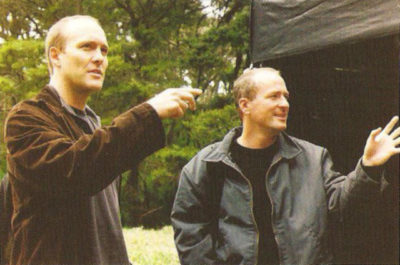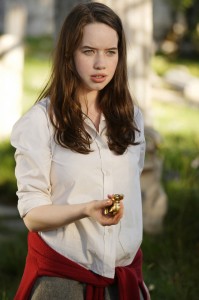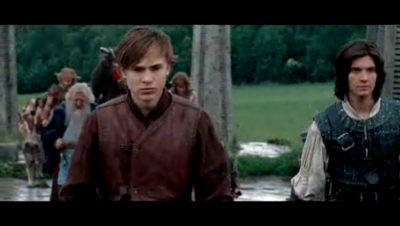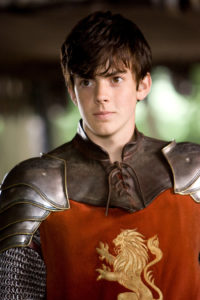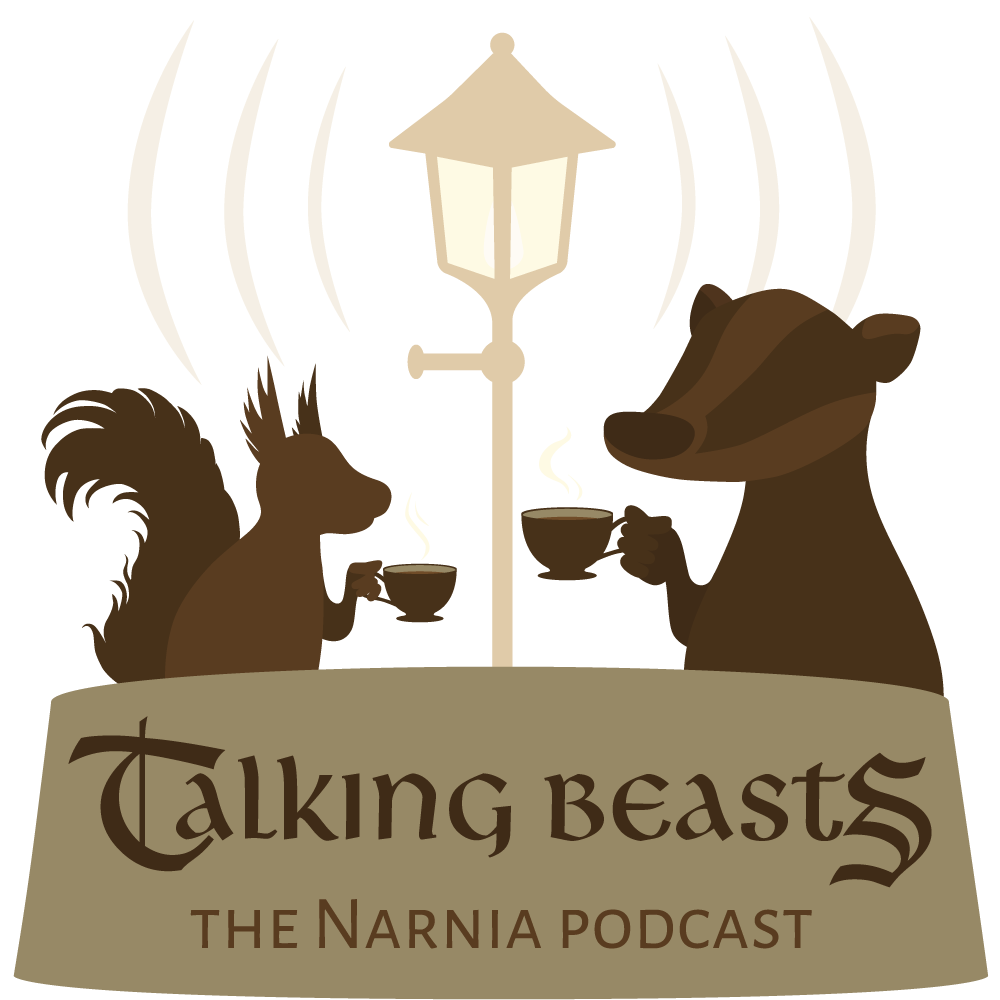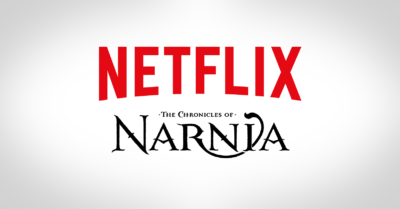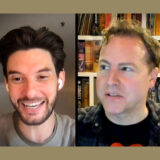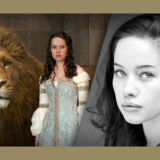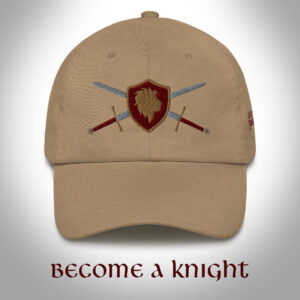NYC Interview Series: Chris Markus and Steve McFeely
Chris Markus and Steve McFeely were great to see and interview because aside from a few short mentions in the Movie Companions and the Narnia.com blog, I’d never heard much of anything from these two before. And not only that, but they were really FUNNY and very enjoyable to listen to. Read about their experiences writing for Prince Caspian here.
Chris Markus and Steve McFeely
Steve: So who have you all talked to already?
We’ve talked to the director, and William and Georgie.
Steve: Alright, I have nothing more to say. [laughter]
Well, since you’re the writers, I’ll start out with a bit of a loaded question — the character of Susan. In the book she when she was given her bow and arrow she was told she was not to be in battle, and in this movie she was kind of warrior princess and leading the charge. Did you purposely try to modernize her character for this movie?
Chris: Definitely. And in the last movie we had it in mind. I do think that the books are somewhat colored by Lewis’s view of the place of woman in the 1940s and 50s. And it just didn’t seem really that there was a reason to have her off to the side because war is for boys. Who knows? War shouldn’t be for anybody, but if you have to, it should be for everybody.
Steve: And Andrew did talk about his discussions with Doug Gresham?
He did, I thought that was really interesting.
Steve: And that’s where the debate lies. Can you get the Lewis Estate to go, “Yes, I understand and we acquiesce to those things.” But we’re big fans of Susan because she’s the voice of doubt, particularly in the first movie. Much like, oh, bitter screenwriters who open the wardrobe door and say, “No way! I’m going home!” So she was the voice of that and um… I think Anna’s great.
Chris: I mean yeah, you have Anna, and she’s got this authority. That person is not sitting back there going, “You guys fight.” I mean, she’s going.
When you do a project like this, and I certainly know that you’ve done a lot of other work, but as a writer, it’s almost like you’re kind of a freelance. As soon as you’re done with some project, you’re trying to move on. Once you’ve done a project like this does it seem like your future is umm… Do you know right then that you’ve got a career and you don’t have to sweat it out, you can pay the bills from here on out?
Chris: I never stop sweating. [laughter]
Steve: Yeah… We don’t have a lot of self… what’s that word?
Esteem?
Steve: Yeah [laughter]. So uhh… I presume that everyone will ultimately not want to hire me. But generally I was very pleased with the outcome of the first one, both critically and commercially, and I think it’s a very good version of that book, as is the same with this one.
Chris: It always depends on the kind of career you want.
Steve: Right.
Chris: If you want to write only the one kind of movie, then maybe you are set for a period of time. We would like to write every single kind of movie and so you have to keep proving yourself because Hollywood always wants to put you in a box and if you’ve written a monkey movie, people will go “Oh, he’s great at monkey movies, but he can’t write a cat movie.” And then I’ll go, “Hey, hang on a minute. I’ll and go home and write a cat movie and prove it to you.” So you’re always having to prove yourself.
Doug Gresham told me that this was a poorer book to work from, but ended up being a better movie. And he elaborated on that, but what do you think he meant by that and would you concur?
Chris: Well, I read all the books when I was a kid and didn’t think about them for a very long time, and when I read them again for this job, this was the one that brought back the most memories for me. And structurally it doesn’t stand up exactly as a book, but there are things in it that to me resonate stronger than the other books. I know why he’s calling it a poorer book.
Steve: Structurally it’s just not a movie if you were to just transcribe the book. It’s a 180-page book and the kids get there and they meet a dwarf named Trumpkin who tells them a 60-page flashback they’re not involved in about a kid we’ve never heard of named Prince Caspian and then they say, “Oh, it sounds like he’s in trouble, we should go do something about that.” So, one of our first jobs — and I was just reading this last night — we wrote a memo in the summer of 2004 after we got this job while everyone was still finishing LWW which didn’t come out til Dec. 05, saying, “All right, when you’re ready and can come up for air, here are the good things and here are the bad things.” And what we had to all agree on was that somebody was blowing that horn really, really early — much earlier than before, because these kids had to get here, and Caspian’s gotta be here, and then they all have to meet in the middle. And if we don’t agree on that, then I don’t know how we’re going to do this movie. So that kind of decision has to be made really early on.
What are some of those things that resonated strongly for you?
Chris: I remember loving that part where the find the ruins and particularly finding that little chess piece. It blew my 10-year-old mind thinking, “Ok… they were there, and now it’s a ruins and they’re there…” and it’s one of those things that I think Lewis is so good at. He makes you go out in the backyard and hunt around, “Maybe there’s a ruin there over by the garage?” So that part really got me — sharp stuff.
How would you describe, for lack of a better term, the theological theme of the book? And the whole set piece in the middle with storming the castle, the consequences for Peter’s act, which was totally new, but we were trying to make sense of the theme there.
Chris: I don’t know about theologically, but on a character level, I think Peter and Caspian (though particularly Peter I think) are dealing with pride. He has been one thing, it’s been taken away from him, and now he’s trying to figure out, “Who am I?” and “How do I prove it?” And that raid is a huge failure on his part and we really wanted to give him that because he can come across as stiffly heroic. Particularly Peter, in that he’s a leader, he wins, he’s blond, you know… [laughter]
What do you have against young handsome boys?
Chris: I resented them when I was a dorky little kid. [laughter] So we really wanted to test his mettle and break it a little bit so he can build himself back up into a real person.
Steve: The story necessitated that kind of thing in that you have two people who occupy similar places. You have two young future kings who ought to be the king of Narnia. And we knew there was going to be conflict and friction there and we wanted to give them one big thing that had consequences. So I’m really pleased with that middle section because we always knew we wanted to have the Narnians interacting with humans on the humans’ terms. Because on the last movie you had no humans other than the White Witch?
Chris: Right.
Steve: And we wanted a cityscape, we wanted a castle, we wanted to be able to do that, but we also wanted them to try something that failed and get some people killed. I’m real proud of the gravity of a lot of this. It’s described as a grittier film, and it is, but I hope not so much so that it turns people off.
Can you talk a little bit about why Lucy sees Aslan and the other children don’t?
Steve: That’s a question of faith I guess.
Chris: Yeah.
Steve: And to go to a question earlier, and I can’t speak for Lewis, but in my conversations with Doug Gresham, for Lewis, the return to Narnia, Prince Caspian, is a discussion or is about what happens when people lose faith. When you don’t keep Aslan in your windshield and he’s in your rear-view mirror.
Chris: Lucy has a car? [laughter]
Steve: So Lucy is much more likely to have him in the front than everybody else who’s worried about themselves and their own problems and their pride and things like that.
Chris: And it depends too on where they are in life. The three older kids, particularly Susan and Peter, have had to face adolescence/adulthood in England for a year and so now they are really trying to figure out where they fit into Narnia and [Lucy] has remained a little more focused on Aslan.
Innocent faith?
Chris: Yeah.
Steve: Yeah, her stories have always been Aslan-centered. She’s pretty clear about that.
What about that opening scene with Peter? The fight on the subway?
Steve: Well, that’s us. I mean we were really interested in something Lewis doesn’t explore particularly. But we were really interested in what happens if you are a King or Queen in Narnia for 15 years and you’ve aged into a completely different actor by the end of the movie with a beard and all this and you walk back through the wardrobe and you’re a kid just like when you left. And then you’ve got to go back to school and then you’ve got school for a year. Whereas you were signing treaties and defeating giants and bringing people together, you’re now doing homework and not going to the prom and whatever. Um, did they have prom in 1940?
Chris: Sure. [laughter]
Steve: But that was the issue. We wanted to show the tough times that at least Peter’s had and what the attitude everyone else has had towards that year off.
Now related to that, this film exemplifies great change to a lot of people in a lot of different situations. In your estimation as writers, what character has to make the greatest change? Or the greatest sacrifice?
Steve: Hmm… who gives up the most…
Because obviously you have Prince Caspian who’s put his life on the line…
Steve: Yeah, but Prince Caspian realizes I think that he’s unready. I mean I’d guess I’d say Peter just because Peter deserves… he deserves to be back. And ultimately realizes that Narnia would be better off without him, under Caspian. So I would say that the early answer would be Peter. And strangely, I was thinking last night and I was struck by how much Peter’s story steps up. Maybe it’s just the battle scenes or the one on one fight… And he certainly has the most culpability.
I have a two-part question. If C. S. Lewis were here in this room what would you say to him? That’s the first question, and the second question is, I’m curious to hear how you dealt with the challenges of the writer’s strike and how it affected the third movie?
Chris: If C. S. Lewis was here, I would shake his hand! Thank him for the house payments. [laughter] No, I mean, what can you say? I think I’d speak to him as the kid who read the books when he was 8 and 10. He stretched my mind a little wider. Beyond that, I…
Steve: Yeah, my hope would be that he’d like the movies. I’m going to take Doug’s word on that. I know that he was anti-movie during his day, but let’s face it, if you were going to make LWW when C. S. Lewis was alive it was going to be a pumped stuffed lion at the end… [does an impression] “Lucy…” [laughter] So that’s going to ruin the magic a little bit. So once we got to a point where that lion looks real, I would hope that he… Then it’s a matter of, if the technology is up to you, then it’s a matter of who’s in charge of the story and staying true to what he would like to see in the story. So my hope is that he would pat me on the head. And as far as the writer’s strike is concerned, we laid things down and picked signs up and marched in a circle.
Chris: Yep.
I would suspect that the third film would be the biggest challenge because the first one is character-driven, this one is action-driven, and action films tend to start doing the action thing where you need more action and more action and…
Steve: You fear there will be too much action in Dawn Treader and not a lyrical journey of spiritual discovery? [laughter]
That’s exactly how I was going to put it.
Steve: Duly noted, sir. [laughter]
Chris: How about a lyrical journey of spiritual action? [laughter]
I’ve got a question about something that was in the book but left out of the movie, which a lot of people will probably think it’s great, but all the greek characters that celebrate and all that. Can you give us your thought process on why you left that out?
Chris: I actually like them in that I like them that kind of pantheistic thing that Lewis gets into with greek mythology showing up and roman mythology and norse things and he really gets a nice mythical soup going. I think basically…
Steve: It’s a long movie now. So when you introduce… Would you have to know who he is? Because then you’ve got to explain it. And then you’re just grinding it to a halt to say “This is…”
Chris: And also I think he has two or three party/dance sequences in the book. In two of them at least, before the problem is solved. And I think audiences are going to go, “Why are they having a dance? There’s a war on.” [laughter] And you know, that is what fauns do.
Steve: It was certainly something we discussed.
Chris: And that’s one of those you’ve gotta fight back and kill your darlings when you’re doing these things, because there are things in every book where you’re like, “I love that, but I can’t put it in the movie.”
Steve: We would have had a lot more paw-sucking bear. [laughter]
Chris: If I could make a Bulgy Bear movie I probably would.
One of my favorite characters actually in the film was Edmund.
Steve: Good!
But it’s really in the scheme of both movies. Just talk about that a little bit.
Steve: Well, and we always were worried about Edmund because he had the biggest change and fixed the most about himself in the first one. So we really felt it was unfair to the audience and the actor and the character to have him be a little crudmuffin at the beginning of this movie. “Oh you remember that thing I went through in the first movie? That really, really big thing?”
Chris: “It didn’t take.”
Steve: “Yeah, I’m still a jerk.” So then what do you do? So you start with a character that’s pretty noble and has his head on his shoulders and while his brother’s got clearly some issues and the sister may not want to be there, so we thought we’d look at him as our Han Solo. He was going to do the right thing, he was probably going to be a little low-key about it, and thankfully Skandar has turned into a handsome actor who is pretty cool.
Chris: And he can do dead-pan with the best of them. That scene where he’s reading the scroll and… I… [laughter]
Steve: But yeah, he worked out well, but his arc is not as severe as the others because his was so severe in the first one.
He did his repenting in the first movie.
Steve: Yeah. He’s a well-adjusted little action man now!
And if you haven’t had enough reading already, check out CinemaBlend’s Interview with Markus and McFeely here.
NarniaFans’ interview with Markus and McFeely
Podcast: Play in new window | Embed

